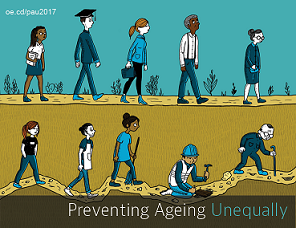Health
Health Inequalities
|
Large inequalities in health status and life expectancy exist across population groups and within the OECD countries. These inequalities in health status are linked to many factors, including differences in exposure to health risk factors and in access to healthcare. Most OECD countries have endorsed, as major policy objectives, the reduction of inequalities in health status and the principle of equal access to healthcare based on need. The OECD regularly monitors to what extent these policy objectives are achieved, as well as the potential benefits and costs of various policy interventions that might help reduce health inequalities
|
 |
Health and inclusive growth
Good health is a key aspect of people’s well-being and enhances opportunities to participate in the labour market and to benefit from economic and employment growth. People with poor physical or mental health are less likely to work and more likely to be unemployed than people in better health.
The relationship also works the other way around: people with higher level of education and higher income tend to be in better health and live longer than those with lower level of education and income.
Greater emphasis on public health and disease prevention, along with improved access to health services, can improve the health status and life expectancy of disadvantaged groups, and also increase their employment rates and social inclusion.
Publications
- Socio-economic and ethnic health inequalities in COVID-19 outcomes across OECD countries, OECD Health Working Paper No. 153 (2023)
- Inequalities in longevity by education in OECD countries: Insights from new OECD estimates, OECD Statistics Directorate Working Paper No. 2017/02 (2017)
- The Labour Market Impacts of Obesity, Smoking, Alcohol Use and Related Chronic Diseases, OECD Health Working Paper No. 86 (2015)
- All on Board - Making Inclusive Growth Happen, 2015
- OECD Mental Health and Work project
Key data
- Inequalities in life expectancy by sex and education level
- Inequalities in self-rated health by income level
Inequalities in risk factors to health
Inequalities in health status are due to many factors, including differences in living and working conditions and in behavioural factors. Lifestyle behaviours (such as nutrition habits, physical inactivity, obesity, smoking and alcohol drinking) are important risk factors for many diseases including diabetes, cardiovascular diseases and cancers. People in lower socioeconomic groups are more likely to smoke, be obese and be exposed to other important behavioural risk factors. Greater efforts targeting modifiable behavioural risk factors among disadvantaged groups can play an important role in promoting healthier lifestyles, offering individuals better choices, and reducing health inequalities.
Publications
- Preventing Harmful Alcohol Use, May 2021
- The Heavy Burden of Obesity: The Economics of Prevention, October 2019
- Health for Everyone? Social Inequalities in Health and Health Systems, September 2019
- Obesity Update 2017
- Social disparities in hazardous alcohol use: self-report bias may lead to incorrect estimates, M. Devaux and F. Sassi, European Journal of Public Health, 2016 Feb;26(1):129-34
- Tackling Harmful Alcohol Use, 2015
- Social Inequalities in Obesity and Overweight in 11 OECD countries, M. Devaux and F. Sassi, European Journal of Public Health, June 2013; 23(3):464-9
- Obesity and the Economics of Prevention: Fit Not Fat, 2010
Presentations
- Watch the webinar on Women And Alcohol: Health Prevention Policies For Better Outcomes For Women (March 2022)
- What are the key health disadvantages across high-income countries?, presentation by Marion Devaux, 2016
- Nutrition and inequalities in health, presentation by Marion Devaux, 2014
Key data
- Smoking among adults
- Alcohol consumption among adults
- Diet and physical activity among adults
- Overweight and obesity among adults
Inequalities in access and utilisation of healthcare
Nearly all OECD countries have achieved universal (or almost universal) health coverage for a core set of health services and goods, except a few countries such as Mexico and the United States which have both taken important steps in recent years to expand health coverage and reduce the number of uninsured people.
Still, inequalities in access to care exist across different socio-demographic groups, including by sex, age, geographic area and socio-economic status, for financial and non-financial reasons (including a shortage of healthcare providers in certain geographic areas).
Findings from OECD work highlight the importance of ensuring proper health insurance coverage for essential health services for all the population, as well as proper geographic distribution of health services across different regions in each country, to ensure effective access to care.
Publications
- Chapter 5 on Access: Affordability, availability and use of services in Health at a Glance 2023: OECD Indicators, November 2023
- Chapter 7 on Accessibility: Affordability, availability and use of services in Health at a Glance: Europe 2022 - State of Health in the EU Cycle
- Unmet needs for health care: Comparing approaches and results from international surveys, Brief, January 2020
- Health for Everyone? Social Inequalities in Health and Health Systems, September 2019
- Income-related inequalities and inequities in health care services utilisation in 18 selected OECD countries, M. Devaux, European Journal of Health Economics, 2013
- Income-Related Inequalities in Health Service Utilisation in 19 OECD Countries, 2008-2009, OECD Health Working Paper No. 58 (2012)
- Geographic Imbalances in Doctor Supply and Policy Responses, OECD Health Working Paper No. 69 (2014)
Presentation
Key data
GENERATION NEXT: HOW TO PREVENT AGEING UNEQUALLY
|
PREVENTING AGEING UNEQUALLY - Released October 18, 2017 How will future retirees fare? The OECD report Preventing Ageing Unequally examines how the two global megatrends of population ageing and rising inequalities have been developing and interacting, both within and across generations. Taking a life-course perspective the report shows how inequalities in education, health, employment and income interact, resulting in large lifetime differences across different groups. The report points to strong policy complementarities and synergies and thus a whole-of-government approach is likely to be much more effective than a series of separate inequality reducing policies. In particular, to ensure a better retirement for all, policies have to be coordinated across family, education, employment, social ministries and agencies.
|
|
FURTHER READING
- Read the EU Country Cancer Profiles 2023 (February 2023) and the overall report Beating Cancer Inequalities in the EU - Spotlight on Cancer Prevention and Early Detection (January 2024)
- Learn more about our work on Cancer Inequalities, and read our article Inequalities in cancer prevention and care across Europe, The Lancet Oncology, Volume 24, Issue 1, 2023, p.10-11 (January 2023)
- Health Statistics
- Health Working Papers
CONTACT US
- Marion Devaux: marion.devaux@oecd.org
- health.contact@oecd.org
 Follow us on Twitter via @OECD_Social
Follow us on Twitter via @OECD_Social
Related Documents
